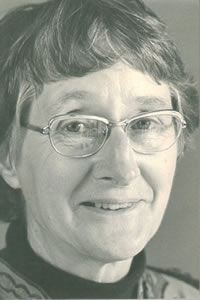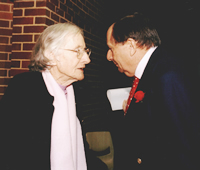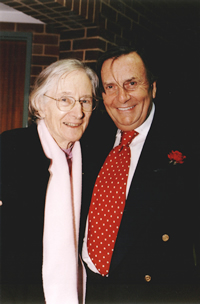

photograph by Roger Garwood
courtesy Fremantle Press
|
|
|||
|
|
|||
|
|
|||
|
|
|||
|
|
|||
|
|
|||

Barry Humphries and Elizabeth Jolley
at the 2002 Elizabeth Jolley Lecture
Photographer: Gillian Forsyth

Barry Humphries and Elizabeth Jolley
at the 2002 Elizabeth Jolley Lecture
Photographer: Gillian Forsyth
|
|
|||
|
|
|||
|
|
|||
|
|
|||
|
|
|||
|
|
|||
Inceptions
We began Elizabeth Jolley: A Bibliography-1965-2007 about 1985. At that time we were colleagues and friends of Jolley at Curtin University of Technology (then the Western Australian Institute of Technology). Earlier, Brian Dibble, then Head of English at Curtin University, met Jolley in 1976 at the launch of her first book, Five Acre Virgin, later interviewing her on Radio 6NR about her story "The Shepherd on the Roof." She so impressed him that in 1978 he hired her as a part-time creative-writing tutor, work at which she was a great success, and they later formed a close friendship. In 1983, he suggested to his colleague Barbara Milech, on study leave in Toronto, that she would enjoy meeting Jolley when the latter arrived there in October to read at her first international conference, the Harbourfront International Festival of Artists. That meeting in Toronto did not happen, but others did, the first being walks through Curtin's pine plantations that led to a lasting friendship. During those walks, Milech learned how much Jolley valued teaching and how it contributed to her writing. Elizabeth Jolley continued to teach at Curtin until retiring as Emeritus Professor of Creative Writing in 2002.
The impulse for the Bibliography was a simple one: we admired her writing and, as we began to write about it, we thought it would be useful to us and others if we were to compile a thorough bibliographic record, especially as Jolley's writing career at that moment (the mid to late 1980s) had achieved a steadily rising trajectory in regard to publications and awards. By 1989 Jolley had, in a single decade, republished her first two collections of short stories (published in the seventies) in a single volume and brought out a third collection, had published nine novels (along with numerous book reviews and newspaper and journal articles), had seen four of those novels translated into German, French, and/or Spanish, and had won major Australian awards for five of them (along with a number of short-story awards). In 1991 we contributed an excerpt from the developing Bibliography to the first book-length consideration of Jolley's writing, Elizabeth Jolley: New Critical Essays, a collection of essays edited by Delys Bird and Brenda Walker.
The original impulse for the Bibliography was, in one way, naive. The intention was to construct a "complete" record of every published work by Elizabeth Jolley, and each and every work about her-criticism, reviews, news articles and anything else. And we also undertook to acquire two hard-copy records of each non-book-length entry in the Bibliography, an endeavour that by the turn of the century led to some thirty-five lever arch files. Those files made possible the full-text digitised versions of many of the items in this online version of Elizabeth Jolley: A Bibliography-1965-2007.
In retrospect that initial ambition reminds us of Dr Casaubon from George Eliot's Middlemarch, the scholar whose character is defined by his ambition to compile "the key to all mythologies." Casaubon is a salutary reminder that a complete bibliography is a fine ideal so long as the bibliographer realises that it is not achievable, and not only because the law of diminishing returns decrees that sometimes it is not worth the expense of trying to find (say) the page numbers of a slightly relevant article in a twenty-year-old foreign-language newspaper. Conversely, beginning in the mid nineties, the internet offered an embarrassment of riches that required making judgements of what to include/exclude from the variety of online materials about Jolley, including some valuable blogger contributions.
The impact of the internet did not immediately impinge on our project. We continued across the 1980s and 1990s, with the help of many, to gather information, more and more employing online resources as we went along, but still working directly with authors, with editors of journals, newspapers, and magazines, with publishers of radio and television programs, and the like. In those years Jolley was a great help-she would lodge information and hard-copy materials related to her activities, publications and media notices with us, perhaps finding that helpful in managing her paperwork, and certainly in the spirit of supporting the project.
By the turn of the century, given the impact of the internet, we knew that the notion we began with-that we would compile a hard-copy scholarly bibliography of works by and about Elizabeth Jolley that could be lodged on reference shelves in libraries across Australia and other countries-was no longer feasible. It was therefore a special scholarly pleasure to begin to work with the Curtin University Library in 2007, the year of Jolley's death, to publish Elizabeth Jolley: A Bibliography-1965-2007 online as the foundation of the Elizabeth Jolley Research Collection. The excitement of doing so was that the Bibliography could appear not only as a portable document file (PDF) in the shape we imagined it when considering a book publication, but also as a searchable data base akin to that provided by the Australian Literature Gateway (AusLit) project, but in this case differently navigable and with the added resource of there being electronic full-text copies attached to as many as possible of the non-book-length print and audio/visual entries.
In this way, we and the Curtin University Library hope to provide scholars and general readers of Jolley from around the world with a rich and accessible resource for thinking and writing about the life and work of one of Australia's pre-eminent writers. Thus the Elizabeth Jolley Research Collection includes not only the Bibliography in two formats, along with attached textual and audio/visual documents, but also a brief biography and a listing of Jolley's awards, prizes and honours. We hope this array of information will support the kind of conversations between readers that a significant writer generates and deserves.
Acknowledgments
George Eliot's Dr Casaubon was misguided not only because he thought he could write "the key to all mythologies" but, more so, because he imagined he could do so on his own. Certainly the quarter-century undertaking that has eventuated in the online publication of Elizabeth Jolley: A Bibliography-1968-2007 could not have happened without the special help of many colleagues to whom we are abidingly grateful.
We are particularly grateful, now and across those many years, to the inestimable contribution of those research assistants who joined the project at various times, each bringing considerable expertise, willingness and commitment to the project, and we give special thanks to Jolley's original and current literary agents, Caroline Lurie and Jenny Darling, both good friends of Jolley, and both patiently supportive of enquiries from our research assistants.
Jean Argyle helped us in the first iteration of the Bibliography in the mid eighties. Linda Browning, then Managing Editor of Curtin University's Black Swan Press, followed for a number of years, providing not only acute research, editorial, and annotation expertise, but also a warm relationship with Elizabeth Jolley that supported Jolley's contributions to it. There followed a transitional period at the turn of the century when Gemma Edeson, Gillian Martin, Christina Houen, Sara Buttsworth and Anne Ryden contributed to the Bibliography in important ways while helping with biographical research on Elizabeth and Leonard Jolley. They kept the Bibliography on track in a time when we were busy otherwise and when the increasing numbers of publications about Jolley needed to be sourced and recorded with the thoughtfulness they each brought to the project-they worked independently, they prepared "to do" lists, and, always, they carefully recorded new entries.
Then Anne-Marie Newton took over, becoming an outstanding project manager-she carefully reconceptualised the overall shape of the growing Bibliography, assiduously tracked down and meticulously entered needed information for it, and consistently provided detailed records of decisions taken regarding inclusions and exclusions, contacts made with Australian and overseas publishers, editors, programmers, and the like. Anne-Marie Newton handed over to Deborah Hunn who continued to expand the Bibliography in good ways and to source missing information. Still later, after a hiatus, Denise Woods worked for several months in 2007 to update the Bibliography in preparation for its online publication, focussing especially on clarifying the complex publication details of the novels; and then Karine Bernard brought her scholarly attention and acute editorial eye both to updating of information and to proofreading the Bibliography for consistency.
It has been a continual pleasure to work with each of these young scholars, and we thank them for their always careful work and always collegial support. We are indebted to them, for without their work the project could not have been sustained and the Bibliography could not have been published.
Equally we are indebted to the support and special skills of staff in the Curtin University Library who in 2007 enabled the online publication of the Bibliography. Gaby Haddow, Curtin Humanities Faculty Librarian, first explored the possibility with us, and then became Project Manager for the Elizabeth Jolley Research Collection-we thank her for all her creative management and all her patience with a complex process. In this she was assisted by the critical and generous support of Libero Parisotto, Curtin University Research Services Librarian, and Lesley Wallace, Manager of the John Curtin Prime Ministerial Library and Library Archives. This trio shared the vision of taking the Bibliography online in a dual format-as a PDF file arranged chronologically and a searchable data base with attached files-and of nesting it in The Elizabeth Jolley Research Collection, with all its promise of a significant archive related to Jolley's published works, together with its short online Biography and list of the Awards, Honours and Artworks related to Jolley. Their vision was made possible by the skilled work of others in their team: by Daniel Piczak, David Wells and Colin Meikle, who ably adapted extant John Curtin Prime Ministerial Library archival data-base programs to the somewhat different purposes of a bibliographic archive; by David Wylie, Archives Technician, whose constant advice in regard to realising the online presentation of the Elizabeth Jolley Research Collection was invaluable; and, most specially, to Safirotu ("Vera") Khoir, whose detailed work regarding entering data from the PDF form of the Bibliography into the searchable data base was critical, and whose cheerful enthusiasm for the project made everything easier.
And not least we are grateful to Sue Grey-Smith for the elegant design of the Elizabeth Jolley Collection website and her generous patience with us as she discussed the design and waited on our texts. Some of the photographs she used were taken by a USA colleague, Ann Arbor, during a visit visit to Elizabeth Jolley's Worooloo cottage, and we are grateful for the permission to use them. As a past Curtin Humanities Senior Librarian, Sue Grey-Smith has been a close colleague of most of those involved in the project; even more, she has a special connection to it for having illustrated, some thirty years earlier, the stories in Fremantle Art Centre Press's first edition of Five Acre Virgin-Jolley's first published book-length work.
The shared vision of all those who have contributed to the Elizabeth Jolley Research Collection and the long gestation of Elizabeth Jolley: A Bibliography-1965-2007 has come together to make available to readers a rich archive of materials related to the life and writings of Elizabeth Jolley

Barbara Milech

Brian Dibble
Barbara Milech is Associate Professor in the Department of
Communication and Cultural Studies at Curtin University. She has
published on Elizabeth Jolley, autobiography and feminist ethics,
edited a volume of Jolley's short stories titled Fellow
Passengers: Collected Stories, and served as an Editor of the
Southern Review, the Australian Journal of Australian Cultural
Studies (later the Journal of Cultural Studies),
and the Journal of the
Association for the Study of Australian Literature.
Brian Dibble, who in 1972 founded what is now Communication
and Cultural Studies at Curtin University, is Curtin's Emeritus
Professor of Comparative Literature. He has published articles on
Elizabeth Jolley's work and written/edited a dozen books, including
his own poetry and prose and two edited volumes of William
Hart-Smith's poetry. His biography of Elizabeth Jolley, Doing Life, was published by the University of Western Australia Press in 2008.